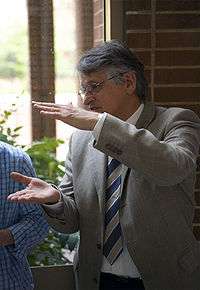Klaus von Klitzing
| Klaus von Klitzing | |
|---|---|
 | |
| Born |
28 June 1943 Schroda, Reichsgau Posen, Germany (present-day Poland) |
| Nationality | German |
| Fields | Physics |
| Known for | Quantum Hall effect[1] |
| Notable awards |
|
|
Website www | |
Klaus von Klitzing (born 28 June 1943, Schroda) is a German physicist, known for discovery of the integer quantum Hall effect, for which he was awarded the 1985 Nobel Prize in Physics.[3][4]
Education
In 1962, Klitzing passed the Abitur at the Artland Gymnasium in Quakenbrück, Germany, before studying physics at the Braunschweig University of Technology, where he received his diploma in 1969. He continued his studies at the University of Würzburg at the chair of Gottfried Landwehr, completing his PhD thesis entitled Galvanomagnetic Properties of Tellurium in Strong Magnetic Fields in 1972, and gaining habilitation in 1978.
Research and career
During his career Klitzing has worked at the Clarendon Laboratory at the University of Oxford and the Grenoble High Magnetic Field Laboratory in France (now LNCMI), where he continued to work until becoming a professor at the Technical University of Munich in 1980. He has been a director of the Max Planck Institute for Solid State Research in Stuttgart since 1985.[5]
The von Klitzing constant, RK = h/e2 = 25812.807557(18) Ω, is named in honor of Klaus von Klitzing's discovery of the quantum Hall effect, and is listed in the National Institute of Standards and Technology Reference on Constants, Units, and Uncertainty. The inverse of the constant is equal to half that of the conductance quantum value.[6]
Today, Klitzing's research focuses on the properties of low-dimensional electronic systems, typically in low temperatures and in high magnetic fields.
Honours and awards
Von Klitzing has won numerous awards and honours including:
- 1981 Walter Schottky Prize
- 1982 Hewlett-Packard Prize
- 1985 Nobel Prize in Physics
- 1985 Directorate for life at the Max Planck Institute for Solid State Research
- 1986 Order of Merit of Baden-Württemberg
- 1988 Honorary Doctorate from the Technical University of Karl-Marx-Stadt
- 1988 Bavarian Maximilian Order for Science and Art
- 1988 Dirac Medal
- 1992 Honorary Degree (Doctor of Science) from the University of Bath[7]
- 1999 Honorary Member of the German Physical Society
- 2003 Elected a Foreign Member of the Royal Society (ForMemRS)[2]
- 2005 Carl Friedrich Gauss Medal of the Brunswick Scientific Society{http://bwg-nds.de/gau%C3%9F-medaille/preistr%C3%A4ger/}
- 2006 Honorary Doctorate of the University of Oldenburg
- 2007 Member of the Chinese Academy of Sciences
- 2007 Member of the Pontifical Academy of Sciences
- 2009 Austrian Decoration for Science and Art[8]
- 2012 Distinguished Affiliated Professor at the Technical University of Munich
- Professor von Klitzing Strasse in Quakenbrück and Klaus von Klitzing Strasse in Landau are named after von Klitzing
References
- ↑ Archived September 18, 2004, at the Wayback Machine.
- 1 2 "Professor Klaus von Klitzing ForMemRS". London: Royal Society. Archived from the original on 2015-11-06.
- ↑ Archived April 6, 2004, at the Wayback Machine.
- ↑ "Klaus von Klitzing". Nobel-winners.com. Retrieved 2015-11-06.
- ↑ K. von Klitzing; G. Dorda; M. Pepper (1980). "New Method for High-Accuracy Determination of the Fine-Structure Constant Based on Quantized Hall". Physical Review Letters. 45 (6): 494–497. Bibcode:1980PhRvL..45..494K. doi:10.1103/PhysRevLett.45.494.
- ↑ "Fundamental Physical Constants—Extensive Listing". Physics.nist.gov. Retrieved 2015-11-06.
- ↑ "Honorary Graduates 1989 to present". bath.ac.uk. University of Bath. Retrieved 18 February 2012.
- ↑ "Reply to a parliamentary question" (PDF) (in German). p. 1841. Retrieved 10 December 2012.
